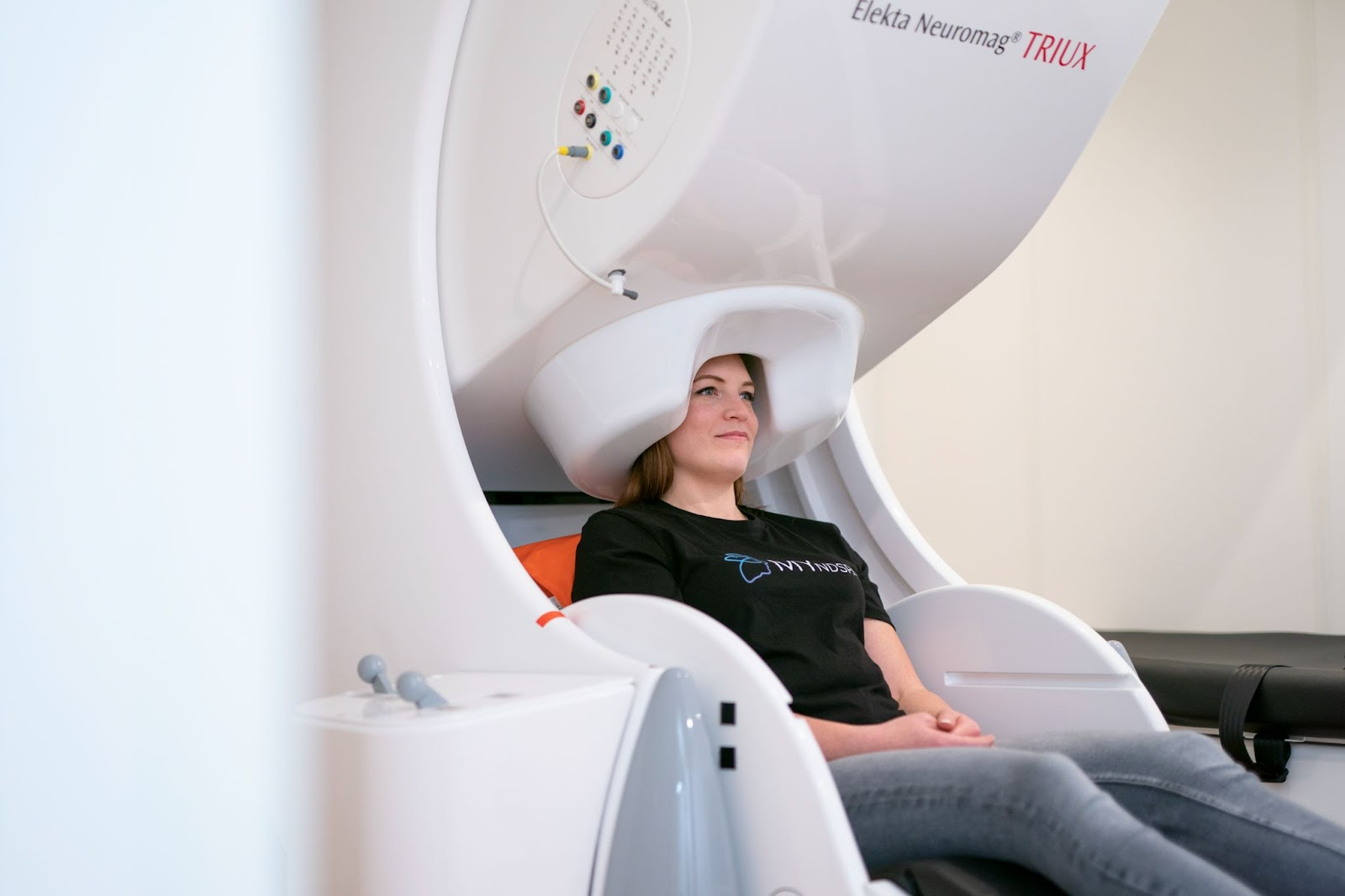Commercial trials for psychedelics-assisted medical treatments will now have access to state-of-the-art brain scanning technology thanks to a new all-London partnership announced today (25th April).

MYndspan’s co-founder Caitlin Baltzer, having her brain scanned using magnetoencephalogy (MEG) technology at MYndspan’s Birmingham site. Image Credit: Myndspan
Clerkenwell Health, who opened Europe’s first commercial psychedelic clinical trials facility in London last Autumn, have partnered with MYndspan, brain wellness and analytics technology pioneers, to give medical researchers direct access to MYndspan’s magnetoencephalography (MEG) brain scanning technology.
This is thought to be the first time that commercial MEG scanners have been made available for use in commercial clinical trials to support pharmaceutical development.
MYndspan’s technology will provide unprecedented levels of accuracy in monitoring a participant’s brain activity and function (both before and after taking psychedelic drugs) as part of trials run at Clerkenwell Health’s central London facility.
Placing London at the heart of medical psychedelics innovation
Psychedelics work by altering neural networks in our brains – the first of its kind partnership will help understand this link definitively, and provide insights into the complex ways in which psychedelic treatments affect the brain. Globally there 81 upcoming clinical trial completions in 2023, of which 46 are commercially sponsored or affiliated.
This new partnership will provide Clerkenwell Health’s clients with valuable new information for understanding the mechanisms of action of the drugs they are developing, and their effectiveness.
This will be crucial in furthering the understanding of the role of psychedelics in tackling a range of complex mental health and neurological conditions – like depression and post-traumatic stress disorder (PTSD) – for the pharmaceutical companies running clinical trials from Clerkenwell’s facility.
The partnership firmly places London at the heart of Europe’s nascent medical psychedelics sector, and Clerkenwell’s establishment of their European-leading commercial facility in the capital.
We’re on a mission to transform treatment for mental health conditions, and our world-first partnership with MYndspan is another critical step toward delivering on that mission. This collaboration in the heart of London provides our clients with both a sophisticated facility in which to test their drug’s effectiveness, alongside world-class technology that allows for real-time assessment of how these drugs – combined with therapy – can treat mental health conditions plaguing millions of people worldwide.”
Tom McDonald, Chief Executive at Clerkenwell Health
Caitlin Baltzer, Cofounder and COO at MYndspan, said:
“With our quick and accurate scanning technology, we are demystifying brain health. Our data helps people understand how treatments, such as psychedelics, affect their brain activity and underlying neural circuitry, which is critical to understanding and treating brain and mental health conditions.
“We’re delighted to partner with an organization aligned with us on revolutionizing the treatment of brain and mental health. London is fast becoming a world-class hub for neuroscience and Europe’s medical psychedelics sector – we’re excited to be part of it, and look forward to future discoveries and collaborations!”
The news of the partnership follows the first clinical trials at Clerkenwell’s London facility being given the green light by the MHRA, and having kicked off in 2023.
Clerkenwell has signed agreements with Canadian and US-based drug developers such as Mindset Pharma and PharmAla Biotech, to test treatments that could treat a range of complex mental health conditions, including social anxiety in those affected by autism spectrum disorder, nicotine addiction and major depressive disorders.

